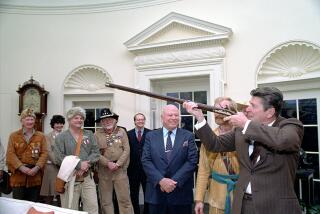No Way to Honor a Mentor
- Share via
LONG BEACH — The city of Los Angeles has joined a lawsuit to ensure an accurate count of its residents in the 2000 Census by using statistical sampling. It seeks to avoid the substantial undercounting that occurred in the 1990 Census, which deprived the city of hundreds of millions of dollars. Opposed is House Speaker Newt Gingrich (R-Ga.), a man much given to invoking his intellectual heroes, the foremost of whom, W. Edwards Deming, is largely responsible for establishing sampling at the Census Bureau back in 1940. It was part of the statistics-based approach central to his work.
Deming was known as “the man who discovered quality.” He began studying with Walter A. Shewhart, who taught that manufacturing quality depends on controlling variation. Shewhart wrote the book on reducing variation over time, enhancing workers’ control over their own performance and focusing management attention on systemic problems beyond the workers’ control. Deming generalized this approach to public-sector service industries, then helped train thousands of production engineers to improve quality in wartime industries during World War II. When his methods were discarded after the war, he realized the need to create a coherent management philosophy to train top management in his approach. His chance came in postwar Japan, where his methods were key to that nation’s remarkable recovery. Recognition in his native land took another 30 years, but even then he remained critical of U.S. management for failing to grasp his philosophy.
It may seem odd that Gingrich, who styles himself a man of ideas, would oppose an innovation associated with his hero. True, a more accurate count threatens to take away GOP congressional seats, but someone else’s name could have gone on the suit. Why sign on personally? However, when you take a closer look, the question becomes: Why not? Gingrich’s thinking clashes with Deming’s so frequently, it hardly makes any difference.
First, Deming was strongly pro-worker and highly critical of management. He taught that workers are inherently motivated to do quality work--it’s management that needs training about quality. Gingrich takes management’s side against workers. Leaving aside the political wrangling and focusing on economics, the evidence is overwhelming. Gingrich opposed raising the minimum wage. He’s still fighting to roll back the earned income credit for low-income working families, while his own $500-a-child tax credit specifically excluded those same families because they earn too little. Citizens for Tax Justice recently reported that two-thirds of the “taxpayer relief” from last year’s GOP-sponsored bill goes to the top 1% of the population (owners and top management), while only one in 17 of the 80% making less than $59,000 get any tax relief at all. Their average savings: $6. Meanwhile, Gingrich has blocked even modest attempts of his own Budget Committee chairman, Rep. John R. Kasich (R-Ohio), to cut corporate welfare.
Naturally, Gingrich argues he’s the workers’ friend--Point 8 from the “contract with America” was the “Job Creation And Wage Enhancement Act.” It included a capital-gains tax cut, small-business incentives and restrictions on government regulation--all in the name of helping workers. Contrary to Gingrich’s promises, the booming profits have been most spectacular in merger deals, where tens of thousands of workers have lost their jobs.
While Gingrich’s rationale flies inside the Beltway, it flies in the face of Deming’s philosophy: increasing incentives for paper entrepreneurship, mergers and acquisitions and quick profit-taking. “Paper profits do not make the pie bigger,” Deming often said, “They give you a bigger piece. You take it from somebody else. It doesn’t help the society.” Rather than making money, Deming taught, a company’s mission is to stay in business and “provide jobs and more jobs” through research and innovation.
Gingrich opposes an active role for government in promoting social good, attacks liberal social programs, strives to privatize government functions and reduce government regulation of business. To counter those who feel government has done substantial good, such as Social Security recipients, Gingrich emphasizes its inefficiency.
But what does Deming say? In “Out of the Crisis,” he approvingly quotes Oscar A. Ornati: “For government, efficiency must be subsumed to equity. If we do not keep equity in the forefront of the public sector, we will destroy our society . . . . Some private sector policies, such as moving to the suburbs, may produce short-run benefits for the company, but are counterproductive in the long run for society and the company.” Compared with his constant attacks on government, how often has Gingrich decried companies chasing short-run profits?
Gingrich touts competition: It breeds independence and success. That’s the underlying message of his attack on the welfare state, as well as his support for free trade. Deming saw things differently, “We have been led astray by faith in adversarial competition,” he warned. Cooperation was key to his approach, one reason the Japanese took to it so readily.
Closely connected to competition is the idea of external rewards. One of Gingrich’s pet projects, “Earning By Learning,” pays children $2 for every book they read. Gingrich cites this as an example of a market-like approach, based on understanding human nature, as opposed to out-of-touch, inefficient, liberal bureaucratic approaches. That’s how Gingrich wants to transform America.
Deming envisions a transformation, too, one that “will restore the individual by abolishment of grades in school on up through the university; by abolishment of the annual appraisal of people on the job, M.B.O. [management by objectives], quotas for production, incentive pay, competition between people.” That hardly squares with bribing kids to read.
Other examples could be added, but it’s more telling to step back and examine Gingrich’s fundamental approach to social problems. Put bluntly, he blames people individually for the troubles they face. To him, that’s about “personal responsibility.” Workers are laid off? It’s their fault.
Deming had a different view: Workers are laid off because of bad management. If workers lose their jobs, management should, too. But even beyond that, the unemployment and poverty rates are functions of the economic system, not of the attitude of an individual worker. The foundation of Deming’s life work was learning to recognize the characteristics of a system in order to improve it, instead of blaming individual workers for things beyond their control.
Perhaps Gingrich should stop citing Deming--and his other heroes, too. Take Peter F. Drucker. Gingrich took the idea of discontinuity from Drucker’s classic “The Age of Discontinuity” and used it to characterize America since the 1960s as in a frightening discontinuity from the rest of U.S. history. But, for Drucker, discontinuity is a deep, multifaceted historical process far beyond the power of any group to either cause or end. It shapes the inevitable transition between profoundly different eras of underlying stability. Like Deming, Drucker provides fascinating insights deeply at odds with the black-and-white world Gingrich inhabits, a world where the need for heroes is so great that what they actually say is rarely heard.
More to Read
Get the L.A. Times Politics newsletter
Deeply reported insights into legislation, politics and policy from Sacramento, Washington and beyond. In your inbox twice per week.
You may occasionally receive promotional content from the Los Angeles Times.










